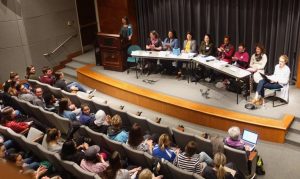Training for Pre-professional Students
 Every year the Carolina Geriatric Workforce Enhancement Program trains students from each of the UNC Health Professions Schools using IPE case consultation
Every year the Carolina Geriatric Workforce Enhancement Program trains students from each of the UNC Health Professions Schools using IPE case consultation
Health care teams in the the 21st century require practitioners to be trained to think and act interprofessionally. Geriatrics patients in particular, benefit from a cohesive, team approach. To meet these needs the Carolina Geriatric Workforce Enhancement Program (CGWEP) will develop educational experiences where students learn with, about and from each other.
Ultimately this training will be expanded out into clinical settings so that at least 100 students per year are having meaningful clinical IPE experiences that they can then carry forward with them into practice. Faculty at UNC from nutrition, occupational therapy, physical therapy, pharmacy, social work and public health have been promoting IPE for years. We are very happy that the CGWEP can bring some additional formal resources to this effort.
Meaningful Learning Points
Since 2010, a six-hour elective in interdisciplinary teamwork at UNC-CH has engaged approximately 600 students from 10 disciplines; medicine, dentistry, dental hygiene, nursing, social work, physical therapy, occupational therapy, nutrition, pharmacy and speech and hearing sciences. Student evaluations have identified the most meaningful learning points as
- the importance of a collaborative health care/interdisciplinary team;
- the value of person-centered, holistic care; and
- learning about other disciplines and their scope of practice.
The ultimate success of these efforts will be that all health science incorporate geriatrics into their curricula. Curriculum will be guided by the Interprofessional Steering Committee. An interprofessional curriculum will be developed to prepare primary care and community-based health care teams statewide to provide quality care to our state’s seniors and the caregivers who assist them. The training will introduce an interprofessional practice model, incorporating staff as possible, and will be customized to the needs of specific practices. Participants will learn about, with, and from each other as they identify practice gaps and where improvements can be made in the care of geriatric patients.
AHEC Collaboration
Ultimately, AHEC partners and primary care practices work in collaboration to conduct customized trainings at the practice level to address geriatric practice gaps and foster an interprofessional approach to care. Each collaborating AHEC identifies rural primary care practices that see geriatric patients. For each practice, the trainings assess readiness of staff in a rural, primary care setting to practice as an interprofessional team and to interact with students from different professions. Steps include assessing the practice’s current communication among professionals and staff and the current knowledge base related to geriatric care. Input is obtained from providers, staff, and students working in the practice.
Geriatric Assessment Tools
Working with geriatric experts at UNC-CH and local providers, AHECs prepares the curriculum based on the individual practice needs such as geriatric patient assessment, mobility and falls prevention, health literacy, dementia, and overview of mental health first aid. Teaching methods include case-based scenarios, group discussions, videos, and skills practice. Sessions include discussion of each participant’s role and communication among staff.
Progress Report
The CGWEP work plan develops infrastructure to support the pipeline of providers into geriatric practice. One of CGWEP’s stated Program goals is to expand an existing pre-professional interprofessional geriatrics curriculum for graduate students and train 100 students from the six health sciences disciplines. As a result, our team exceeded its goal by training 656 interprofessional students from the ten disciplines mentioned above.
These Health Sciences students completed a two-session, six hour experience entitled “Interprofessional Education Collaborative”, where they practiced interprofessional skills in small groups. Faculty from all the aforementioned disciplines modeled and coached interprofessional practice using three geriatric cases. Also, we received evaluations from 96% of the students and analysis is underway.
Project staff have analyzed the quantitative and qualitative evaluation data from the IPE Geriatrics Preprofessional experiences. UNC-CH has also leveraged interprofessional course development work funded under a small grant from the North Carolina AHEC program.
Rapid Cycle Quality Improvement
The CGWEP has a commitment to continuous improvement. As a result, we review projects frequently using a Plan, Do, Study, Act formula. For this first CGWEP RCQI experience, project staff reviewed the evaluation results from past iterations of the IPE Collaborative experience. Prior to CGWEP, 53% percent of the prior year’s students completed evaluations. Thus, RCQI actionable items included:
- Increase the number of students who complete evaluations.
- Increase the number of participating disciplines.
- Rewrite case scenarios to promote more cross talk.
- Give students more guidance on the exercise’s goal – improving team information sharing. Not necessarily getting the “right” answer for each case.
- Select curriculum methodologies. The team also debated the pedagogical advantages of using standardized patients or video interviews versus written cases. In addition, including formal instruction on team building was also up for discussion.
Following the completion of the first CGWEP 166-student cohort in February 2016, a second RCQI cycle is currently in process. Ninety-six percent of the students completed an online evaluation and a reflection piece on their learning experience. The evaluation includes reactions to the teamwork process as well as the cross discipline learning. In addition, we coded qualitative themes from the free-form responses. Consequently, the results will guide the implementation of the same experience for students in the next group. Currently, a peer-reviewed publication highlighting these stellar results is in draft form.
The Future
The CGWEP staff are interested in pursuing additional grant funding for IPE practice. Dental/dental hygiene and pharmacy faculty already received a $10,000 grant. Specifically, this funding will solidify involvement of pharmacy students in the dental curriculum. The CGWEP is very supportive of the appointment of a new Vice-Chancellor for Interprofessional Practice. The Health Sciences Library will house this person who will work to integrate IPE training into all of the UNC Health Professions schools.